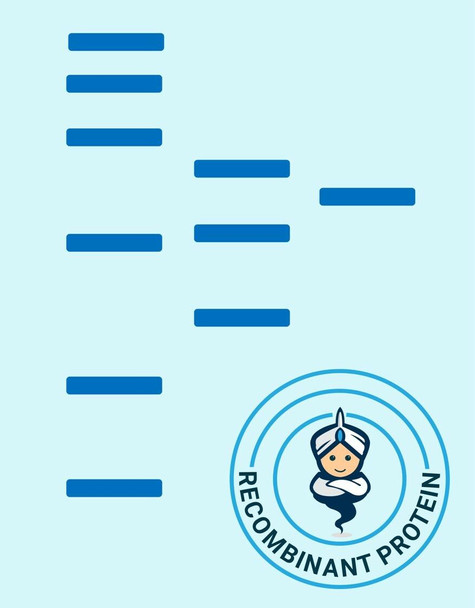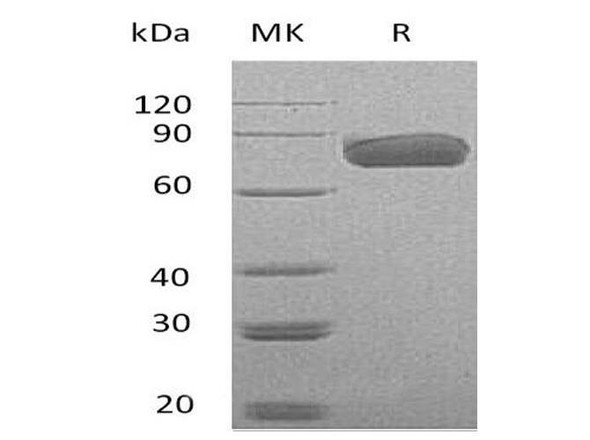Mouse CD274 Recombinant Protein (RPPB3055)
- SKU:
- RPPB3055
- Product Type:
- Recombinant Protein
- Species:
- Mouse
- Uniprot:
- Q9EP73
- Research Area:
- CD Antigens
Description
| Product Name: | Mouse CD274 Recombinant Protein |
| Product Code: | RPPB3055 |
| Size: | 20µg |
| Species: | Mouse |
| Target: | CD274 |
| Synonyms: | Programmed cell death 1 ligand 1, PD-L1, PDCD1 ligand 1, Programmed death ligand 1, B7 homolog 1, B7-H1, CD274, B7h1, Pdcd1l1, Pdcd1lg1, Pdl1, A530045L16Rik. |
| Source: | Escherichia Coli |
| Physical Appearance: | Sterile Filtered colorless solution. |
| Formulation: | CD274 protein solution (1mg/ml) containing 20mM Tris-HCl buffer (pH8.0), 10% glycerol and 0.15M NaCl. |
| Stability: | Store at 4°C if entire vial will be used within 2-4 weeks. Store, frozen at -20°C for longer periods of time. For long term storage it is recommended to add a carrier protein (0.1% HSA or BSA).Avoid multiple freeze-thaw cycles. |
| Purity: | Greater than 85% as determined by SDS-PAGE. |
| Amino Acid Sequence: | MGSSHHHHHH SSGLVPRGSH MGSHMFTITA PKDLYVVEYG SNVTMECRFP VERELDLLAL VVYWEKEDEQ VIQFVAGEED LKPQHSNFRG RASLPKDQLL KGNAALQITD VKLQDAGVYC CIISYGGADY KRITLKVNAP YRKINQRISV DPATSEHELI CQAEGYPEAE VIWTNSDHQPVSGKRSVTTS RTEGMLLNVT SSLRVNATAN DVFYCTFWRS QPGQNHTAEL IIPELPATHP PQNRTH |
CD274 takes part in the costimulatory signal, vital for T-cell proliferation and creation of IL10 and IFNG, in a PDCD1-independent and an IL2-dependent manner. CD274 collaboration with PDCD1 inhibits cytokine production and T-cell proliferation.
CD274 Mouse Recombinant produced in E.Coli is a single, non-glycosylated polypeptide chain containing 246 amino acids (19-239 a.a) and having a molecular mass of 27.6kDa (Molecular size on SDS-PAGE will appear higher).CD274 is fused to a 25 amino acid His-tag at N-terminus & purified by proprietary chromatographic techniques.
| UniProt Protein Function: | Involved in the costimulatory signal essential for T-cell proliferation and IFNG production in a PDCD1-independent manner. Interaction with PDCD1 inhibits T-cell proliferation by blocking cell cycle progression and cytokine production. |
| NCBI Summary: | The protein encoded by this gene is an immune inhibitory receptor ligand that is expressed by hematopoietic and non-hematopoietic cells, such as T cells and B cells and various types of tumor cells. The encoded protein is a type I transmembrane protein that has immunoglobulin V-like and C-like domains. Interaction of this ligand with its receptor inhibits T-cell activation and cytokine production. During infection or inflammation of normal tissue, this interaction is important for preventing autoimmunity by maintaining homeostasis of the immune response. In tumor microenvironments, this interaction provides an immune escape for tumor cells through cytotoxic T-cell inactivation. Mice deficient for this gene display a variety of phenotypes including decreased allogeneic fetal survival rates and severe experimental autoimmune encephalomyelitis. [provided by RefSeq, Sep 2015] |
| UniProt Code: | Q9EP73 |
| NCBI GenInfo Identifier: | 83287885 |
| NCBI Gene ID: | 60533 |
| NCBI Accession: | Q9EP73.1 |
| UniProt Related Accession: | Q9EP73 |
| Molecular Weight: | 32,780 Da |
| NCBI Full Name: | Programmed cell death 1 ligand 1 |
| NCBI Synonym Full Names: | CD274 antigen |
| NCBI Official Symbol: | Cd274�� |
| NCBI Official Synonym Symbols: | B7h1; Pdl1; Pdcd1l1; Pdcd1lg1; A530045L16Rik�� |
| NCBI Protein Information: | programmed cell death 1 ligand 1 |
| UniProt Protein Name: | Programmed cell death 1 ligand 1 |
| UniProt Synonym Protein Names: | B7 homolog 1; B7-H1; CD_antigen: CD274 |
| Protein Family: | Programmed cell death |
| UniProt Gene Name: | Cd274�� |








